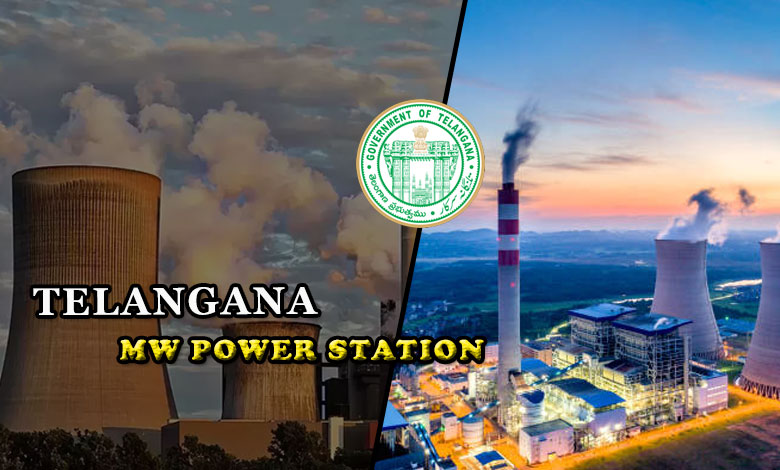Telangana Plans New 800-MW Power Station in Ramagundam Amid Controversy Over Procedures and Ownership
However, the decision to construct the new power station has raised questions regarding the adherence to Central Electricity Authority (CEA) procedures, which are typically followed when decommissioning old power plants and establishing new ones.

Hyderabad: The Telangana state government is moving forward with its ambitious plan to build an 800-MW supercritical thermal power plant in Ramagundam, located in the Peddapalli district.
This new plant is intended to replace the aging 62.5 MW Ramagundam B thermal power plant, which was shut down in June last year due to poor performance and environmental concerns.
However, the decision to construct the new power station has raised questions regarding the adherence to Central Electricity Authority (CEA) procedures, which are typically followed when decommissioning old power plants and establishing new ones.
Table of Contents
The Controversial Plan: A Joint Venture Between TGGENCO and SCCL
The new power station is set to be established as a joint venture between TGGENCO (Telangana Power Generation Corporation) and Singareni Collieries Company Limited (SCCL). While this approach has garnered support from some quarters, it has faced significant opposition from various stakeholders, particularly from GENCO engineers and employee unions who argue that the plant should be fully owned and operated by TGGENCO, without the involvement of SCCL.
Skipping Standard Procedures for Power Plant Development
In a move that has sparked concerns over transparency and procedural compliance, the Telangana government has begun working on the new power plant without following the standard procedures set by the Central Electricity Authority (CEA). Normally, the process to establish a new thermal power plant involves a detailed procedure that includes:
- Decommissioning the Old Plant: The state energy department must first issue a Government Order (GO) to recommend the decommissioning of the old plant. After that, the TGGENCO governing body must approve this decision.
- Union Power Ministry Approval: The proposal for decommissioning the old plant must then be sent to the Union Power Ministry for approval.
- CEA Clearance: After receiving the Union Ministry’s consent, the proposal is forwarded to the CEA, which evaluates and approves it. Only then can the old plant be officially removed from the list of installed thermal power stations.
However, the Telangana government has bypassed these critical procedural steps. Despite the old Ramagundam B plant being shut down over a year ago, no formal decommissioning orders have been issued, and GENCO has not followed through with the necessary steps for the plant’s demolition and equipment sale.
Lack of Decommissioning Process and Demolition Plans
The process for demolishing the old Ramagundam plant involves appointing an expert committee to assess the potential revenue from dismantling and selling its equipment. Once the assessment report is complete, tenders should be called for the demolition work. Unfortunately, the state government has yet to initiate this crucial process, as no decommissioning orders have been issued. This raises doubts about the feasibility of setting up a new plant in the same location without removing the old infrastructure.
The Shift in Ownership Proposal: GENCO vs. SCCL
Initially, the Telangana government proposed that SCCL would solely establish the new power plant. However, the decision has since changed, and the government now plans to build the plant in collaboration with TGGENCO, forming a joint venture between the two entities. This shift in ownership has become a point of contention among stakeholders.
Also Read: Raids in Hyderabad Uncover Unhygienic Factories; 1400 kg of Ginger Garlic Paste Seized for Adulteration Concerns
GENCO engineers and employees are strongly opposing the joint venture model, arguing that TGGENCO should own the new power station outright. Recently, members of the Telangana Power Employees Joint Action Committee (TGPEJAC) staged protests at various offices, including circle offices, corporate offices, and generating stations, demanding that the power plant be developed and managed solely by TGGENCO, without the involvement of Singareni Collieries.
Political and Union Opposition to the Joint Venture
The decision to bring SCCL into the joint venture has sparked strong reactions from labor unions, who have voiced concerns about potential conflicts of interest and the long-term impact on the employees of TGGENCO. They argue that GENCO is well-equipped to handle the power station on its own, without needing to partner with a mining company like SCCL.
The opposition to this joint venture is also politically charged, as various labor unions and political parties have raised concerns about the privatization of the state’s power assets. They fear that the joint venture could dilute TGGENCO’s control over the power sector and undermine its capacity to provide affordable electricity to the people of Telangana.
Government’s Response to Criticism
Despite the backlash, the Telangana government has pushed ahead with its plans to establish the 800-MW supercritical thermal power plant in Ramagundam. The government has emphasized that the plant is necessary to meet the growing energy demand in the state and will be crucial for ensuring a reliable power supply.
While the project is seen as a significant step in Telangana’s power sector, it remains to be seen how the state government will address the procedural concerns and resolve the ongoing opposition from GENCO employees and labor unions.
Conclusion: Future of Ramagundam Power Station and Telangana’s Energy Landscape
The proposed 800-MW thermal power plant in Ramagundam is central to Telangana’s energy future. However, the state’s decision to bypass standard procedures and its controversial choice of joint venture ownership have raised serious concerns about the project’s transparency and its long-term impact on GENCO and SCCL employees. The state government must address these concerns to ensure that the new power station is developed in a manner that benefits both the people of Telangana and the workers in the power sector.
As the project moves forward, it will be crucial for the government to find common ground with its stakeholders, ensuring that the energy needs of the state are met while maintaining procedural integrity and fostering a transparent, sustainable energy future.
